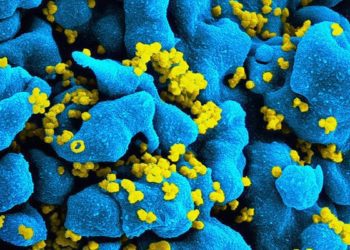Vaccinated individuals less likely to develop SARS-CoV-2 anti-nucleocapsid antibodies post-infection
1. Following a SARS-CoV-2 (COVID-19) infection, patients who received the Moderna mRNA-1273 vaccine were less likely to develop anti-nucleocapsid antibodies (anti-N abs) than those who received a placebo control.
2. A higher viral load at diagnosis was associated with a significantly increased likelihood of seroconversion to anti-N abs.
Evidence Rating Level: 1 (Excellent)
Study Rundown: Although polymerase chain reaction (PCR) is the gold standard in diagnosing active SARS-CoV-2 infection, an antibody-based test is necessary to identify recent or historical infections. Tracking these antibodies is key in monitoring population prevalence and post-infection complications of COVID-19. The development of anti-N abs is not elicited by any current COVID-19 vaccines. Therefore, they have been used to test for past SARS-CoV-2 infections. However, it is unclear if pre-infection vaccination can affect the seroconversion rate and the sensitivity of antibody testing. The present article reports a sub-study of the original phase three trial of the mRNA-1273 (Moderna) COVID-19 vaccine. Specifically, focusing on those who developed symptomatic PCR-confirmed COVID-19 during the blinded period. The results demonstrate that vaccine recipients were significantly less likely to seroconvert to anti-N abs than placebo recipients post-infection. A higher number of SARS-CoV-2 copies at diagnosis was also correlated with a higher chance of seroconversion. Despite its small sample size and limited data on novel variants, this study demonstrated attenuated seroconversion in vaccinated individuals and emphasized the need to consider vaccination status when interpreting anti-N abs test results.
Click here to read the study in AIM
In-Depth [randomized controlled trial]: The present sub-study was nested within the phase three randomized, double-blind, controlled efficacy trial of the Moderna mRNA-1273 COVID-19 vaccine. Participants were randomized 1:1 to receive either two 100µg doses of mRNA-1273 vaccine or a placebo on day 1 and day 29. Blood samples and nasopharyngeal swabs (for PCR testing) were collected on days 1, 29, and 57, and participant decision visit (PDV). During the trial, participants with COVID-19 symptoms underwent additional nasopharyngeal swabs and PCR tests. Anti-N abs were detected from collected blood samples using the Elecsys immunoassay, where a “reactive” result indicated seroconversion. The study stratified SARS-CoV-2 infections based on time of detection via PCR or anti-N abs testing. Overall, 700 participants (52 vaccine recipients and 648 placebo recipients) who were SARS-CoV-2-negative at baseline were diagnosed with COVID-19 at least 14 days after the second dose. Within this group, seroconversion occurred in 21 of 52 mRNA-1273 vaccine recipients (40%; 95% Confidence Interval [CI], 27% to 54%). This was significantly lower than in the placebo recipients, where 605 of 648 showed seroconversion (93%; 95% CI, 92% to 95%; p<0.001). The median COVID-19 diagnosis timepoint was 53 days before the PDV, with a range from 5 to 150 days. Among the vaccinated cohort, anti-N seropositivity was not associated with neutralizing antibody titers. However, higher anti-N seropositivity was associated with a longer duration between illness and the last vaccine dose in this cohort (p = 0.048). Lastly, it was noted that a higher SARS-CoV-2 copy number was associated with anti-N seropositivity, although vaccine recipients were still 13.67 times less likely to seroconvert than placebo recipients at any given viral load. These results suggested that vaccine-induced immunity could attenuate seroconversion and the study was the first to report this in a randomized controlled trial setting. Despite the small sample size and currently limited data on novel SARS-CoV-2 variants, this study emphasized the need to be cognizant of vaccination status when implementing and interpreting serological testing for anti-N abs.
Image: PD
©2022 2 Minute Medicine, Inc. All rights reserved. No works may be reproduced without expressed written consent from 2 Minute Medicine, Inc. Inquire about licensing here. No article should be construed as medical advice and is not intended as such by the authors or by 2 Minute Medicine, Inc.







